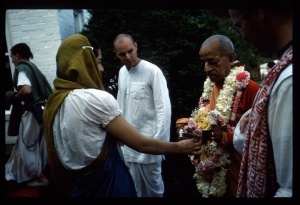CC Madhya 6.120: Difference between revisions
No edit summary |
(Vanibot #0054 edit - transform synonyms into clickable links, which search similar occurrences) |
||
| Line 17: | Line 17: | ||
<div class="synonyms"> | <div class="synonyms"> | ||
''vedānta'' | ''[//vanipedia.org/wiki/Special:VaniSearch?s=vedānta&tab=syno_o&ds=1 vedānta]'' — Vedānta philosophy; ''[//vanipedia.org/wiki/Special:VaniSearch?s=paḍāite&tab=syno_o&ds=1 paḍāite]'' — to instruct; ''[//vanipedia.org/wiki/Special:VaniSearch?s=tabe&tab=syno_o&ds=1 tabe]'' — then; ''[//vanipedia.org/wiki/Special:VaniSearch?s=ārambha&tab=syno_o&ds=1 ārambha]'' — beginning; ''[//vanipedia.org/wiki/Special:VaniSearch?s=karilā&tab=syno_o&ds=1 karilā]'' — made; ''[//vanipedia.org/wiki/Special:VaniSearch?s=sneha&tab=syno_o&ds=1 sneha]'' — affection; ''[//vanipedia.org/wiki/Special:VaniSearch?s=bhakti&tab=syno_o&ds=1 bhakti]'' — and devotion; ''[//vanipedia.org/wiki/Special:VaniSearch?s=kari’&tab=syno_o&ds=1 kari’]'' — showing; ''[//vanipedia.org/wiki/Special:VaniSearch?s=kichu&tab=syno_o&ds=1 kichu]'' — something; ''[//vanipedia.org/wiki/Special:VaniSearch?s=prabhure&tab=syno_o&ds=1 prabhure]'' — unto the Lord; ''[//vanipedia.org/wiki/Special:VaniSearch?s=kahilā&tab=syno_o&ds=1 kahilā]'' — said. | ||
</div> | </div> | ||
Latest revision as of 23:39, 19 February 2024

A.C. Bhaktivedanta Swami Prabhupada
TEXT 120
- vedānta paḍāite tabe ārambha karilā
- sneha-bhakti kari’ kichu prabhure kahilā
SYNONYMS
vedānta — Vedānta philosophy; paḍāite — to instruct; tabe — then; ārambha — beginning; karilā — made; sneha — affection; bhakti — and devotion; kari’ — showing; kichu — something; prabhure — unto the Lord; kahilā — said.
TRANSLATION
He then began to instruct Lord Caitanya Mahāprabhu on Vedānta philosophy, and out of affection and devotion, he spoke to the Lord as follows.
PURPORT
The Vedānta- or Brahma-sūtra, written by Śrīla Vyāsadeva, is a book studied by all advanced spiritual students, especially by the sannyāsīs of all religious communities (sampradāyas). The sannyāsīs must read the Vedānta-sūtra to establish their final conclusions concerning Vedic knowledge. Here, of course, the Vedānta mentioned is the commentary of Śaṅkarācārya, known as Śārīraka-bhāṣya. Sārvabhauma Bhaṭṭācārya intended to convert Caitanya Mahāprabhu, who was a Vaiṣṇava sannyāsī, into a Māyāvādī sannyāsī. He therefore made this arrangement to instruct Him in the Vedānta-sūtra according to the Śārī'raka commentary' of Śaṅkarācārya. All the sannyāsīs of the Śaṅkara-sampradāya enjoy seriously studying the Vedānta-sūtra with the Śārīraka-bhāṣya commentary. It is said, vedānta-vākyeṣu sadā ramantaḥ: “One should always enjoy the studies of the Vedānta-sūtra.”